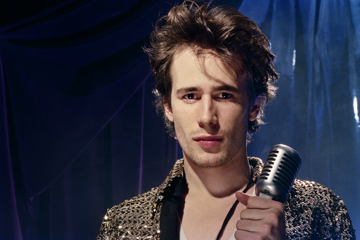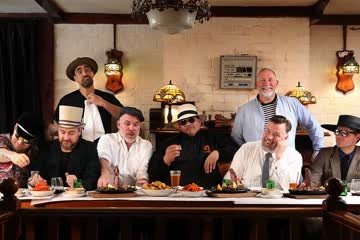How Community Radio Stations 'Vehemently' Loathed Triple J
"There was one station in particular that produced anti-triple j artefacts and I actually had foodstuffs pelted at me"
The world on nearly every level is a lot different than it was back in 1975 when new radio station Double J began giving Sydney listeners an alternative listening option to the dreary offerings of the time, a place where finally one could find both non-mainstream music and an anti-establishment perspective.
History shows that the ABC-funded station soon outgrew its digs in the NSW capital and went national in the early ‘90s, expanding its reach but not compromising its vision or mission statement. Triple j has subsequently played a massive role in our nation’s rich cultural fabric – to the delight of some and the chagrin of others – and this is being celebrated with new documentary Sounds Like Teen Spirit. The doco studies the beginnings and evolution of triple j and its import in non-musical realms such as feminism, politics, sexuality and even humour, as well as the role played by the myriad of presenters who also became synonymous with the station and its ideals just by dint of their voices and personalities.
One of those presenters, Helen Razer – who dominated the airwaves between 1990-1998, mostly with her on-air partner-in-crime Mikey Robins – has kindly taken time out to share some of her thoughts and recollections on triple j with The Music via email.
How important do you believe the role of Double J/triple j has been on the Australian scene in the last 40 years?
I tend to always ignore my beliefs in favour of evidence and with an intangible thing like “cultural importance”, this is difficult to assess. But, I can say that I saw a lot of musicians get housing loans thanks to triple j, and my favourite metric of all was one I remember seeing in the newspaper back in about 1994. Then, people used to advertise in print for flatmates and the share-housing column used to regularly ask for tenancy applications from “triple j listeners”. No other radio station was accrued this privilege and I think the fact people were prepared to create, in print, an entire identity category around the station is an index of its importance.
Don't miss a beat with our FREE daily newsletter
What do you see as the station’s core strengths or attributes?
The foundational strength of the station is its independence. Commercial media must be one-size-fits-most in its approach so risk is avoided in favour of familiarity. Without shareholders and advertisers and idiot ideas about “what the people want” to appease, the place is able to continually to reassess what it does more freely.
Triple j has introduced some incredible characters into Australian pop culture over the years – obviously the music is sacrosanct but do you believe the announcers have played a big role in the station’s appeal?
The usefulness of announcers is absolutely secondary to that of music. Sure, a listener might develop a mild affection for a particular on-air persona but this is as nothing set against the very intimate and intense relationship a young person has with music. This is not to say I don’t have an ego the size of a respectable moon. I just knew, as a mad music fan myself, that I was always in orbit around Planet Rock.
When you and Robins were ruling the airwaves did you have creative control or were you operating within strict parameters and guidelines? Was your on-air rapport integral to your success as a team?
Obviously and drearily, I have to tell you that all ABC broadcasters are subject to internal editorial policies. But these amount to “don’t be a fuckwit”, “don’t be a bigoted or obscene fuckwit” and “try to be impartial and don’t flog commercial interests on air”. So these were pretty easy to observe. Occasionally, some new manager or other would have just read an American radio industry handbook and would try to enforce their flavour-of-the-month attitude to youth culture – I remember once we were taken to breakfast and told to be more “positive”, which was particularly galling for two people who dislike nearly everything. But mostly, our ratings surveys spoke for our success as negative arseholes. I think our affection for each other, which preceded the job and continues long past it, kept us tolerable to the audience and, of course, able to cope with mutual bad moods every morning at 5am.
Do you have a favourite on-air moment or recollection?
I think it’s due in part to my advanced age but also to the disposable nature of the medium that makes it all a bit of a blur. Radio tends to work only within the moment it is produced and the feeling that is created is much more valuable as a memory than the content or talent that created it. I remember Mikey bringing in a poorly tuned guitar and performing the weather report as a drug-fucked Bob Dylan and I remember him replaying an incoherent answering machine message I had left for him on a Saturday night from the payphone at the Judgement Bar saying “You’re my best friend, my very best friend and why won’t anyone here have sex with me?” or similar. But these things are better experienced than they are relayed.
New doco Sounds Like Teen Spirit paints a picture of Double J (and early triple j) as having an anti-establishment bent and being a panacea for the staid and conservative media of the day – is this still relevant in this day and age?
As I mentioned, I think it’s the framework for triple j that’s more important than what is built upon it. When you don’t have a market imperative to sell, sell, sell, you have the potential to explore largely ignored cultural territory and this produces, sometimes, an unorthodox approach to broadcast. Sometimes it doesn’t. Sometimes, all you have is the appearance of radicalism without any real interrogation of programming convention and for all the hoo-ha about Double J once being the hub for all that was marvellous and odd, from what I’ve heard in archive form, a lot of what went to air was pish. It was just like commercial radio but with more Birdman, oblique pot references and longer mic breaks. This, I’m sure, was gratefully received by many but I think it’s too easy to praise radicalism when all you really have is the appearance of radicalism. To be clear, I would apply this criticism to myself as well. I think it is really difficult to produce culture within a mainstream context that is not itself mainstream.
All of this Frankfurt School fretting about the sameness of media aside: yes, I do think an answer to conservatism of all kinds is more important now than ever. The ‘70s were not, in fact, conservative. They were radical. Liberation was something broadly discussed and now, instead of freedom, we discuss equality; instead of social change, we discuss tolerance. We generally believe ourselves to be more advanced and just and inclusive despite all evidence to the contrary and I think this is dangerous bullshit and I would wish for more sites of disruption. I wish I could hear more of it at triple j but I have to say, outside of Safran’s very excellent program, I don’t. But this might change.
How important has the national reach of triple j been in taking music to regional areas who were previously starved of access to contemporary music culture?
I remember being a Canberra youngster and yearning for triple j which I saw as a conduit to something better than Workday Double Plays and icy cold cans of Coke dispensed from the black thunder. I started working there shortly after it launched in the ACT and I kind of regret never having had that ‘90s regional adolescent experience of “discovery”. I met a lot of kids in country centres who just seemed so grateful for a link to freaks like them and although I am not a sentimental person I found it quite touching. Music means so much to kids and music of a more complex kind made by people not much older than and almost as confused as them is especially precious.
Do you think that triple j complements community radio stations (RRR, PBS, FBi, ZZZ et al) or are they seen as competition?
The triple j/public radio rivalry works very much as the Sydney/Melbourne one does. Which is to say, Sydney thinks that Melbourne is a very nice place to visit and Melbourne thinks Sydney is up itself and needs to be taken down a peg or two. I started out in public radio and I like it very much and I think these physical places, in particular, have real value for the people who volunteer within them. But I was quite surprised by the vehemence of the loathing community stations had for us. There was one station in particular that produced anti-triple j artefacts and I actually had foodstuffs pelted at me from one of its representatives on Brunswick Street, back in the day. They’re different institutions with very different functions and audiences of a size that cannot be meaningfully compared.
Triple j has many critics who argue that the station’s playlists and demographics need to be more inclusive – do you believe that there’s merit to those viewpoints?
I find these arguments both tedious and hopeful. Tedious because triple j can never appease everyone and hopeful because so long as people are engaged with the ABC, this is evidence that they still feel, as they should, that it belongs to them.
There is this fucking inane idea that “announcers should play what they want”. As I have written elsewhere, if that was the case with me, all I would have played was Bikini Kill and Rolling Stones album tracks. When you are dealing with 2 million pairs of young Australian ears, you don’t take a “play what you feel” approach and determine that the taste of one individual fuckwit is better than music that has been selected in a more dispassionate way.
Triple j needs a playlist to ensure that its self-enforced programming objective – 40% Australian, Indigenous content and presumably female vocal content – is met. You don’t meet that by letting a single announcer play a bit of whatever they fancy and you don’t rotate music at different times of the day without recourse to a database. Frankly, I am too old to assess whether or not all genres and demographics are being represented and addressed. I would say I think that the best way to deal with this is by engaging an advisory committee from both within and outside the station.
Do you look back fondly at your tenure at triple j and the role you played in bringing cool music to the Australian masses?
It was a great time and an extraordinary privilege. It really took very little effort and it pays a fuckload better than writing.
Sounds Like Teen Spirit airs on ABC 8.45pm tonight.







